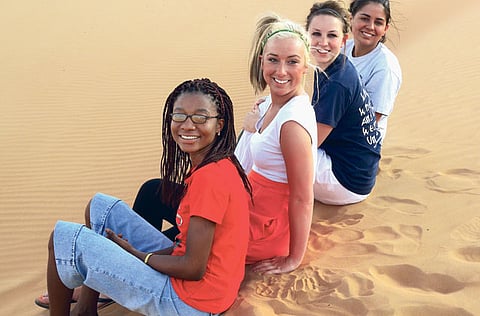Using classroom to fight profiling
An independent academic visit by a US professor illustrates the importance of individual efforts in achieving a critical mass that could battle stereotypes

American professor Dr John King is on a mission to change the perceptions his students in the US have of the Middle East — an undertaking inspired by a trip to the UAE five years ago.
Dr King, a professor of public relations (PR) at East Tennessee State University in the US, first visited the UAE in 2005 as part of a university programme accreditation team.
He has now become the first professor in the southern US state to launch study abroad programmes to the region.
The three-week programme, in its second year, albeit small, could have a large impact on a southern US campus of 14,000 students.
In 2006, as part of his sabbatical, Dr King had a short teaching stint at the American University of Sharjah.
"I was surprised at how similar students here are to the ones in the US," said Dr King. "I think for most Americans, unless they study a lot about the Middle East, what they get is just a Western media view," he added.
"Even though news reports are truthful, if all they show is the conflict — which is pretty much what they do in the US — people formulate understandings [of the region] based on that, rather than actual interchanges with other human beings," said King.
Cultivation theory
"The first time I mentioned to anyone I was coming to Dubai, people said to me ‘be safe, be careful'," said Dr King. "What I've learned though, is you're generally much safer here than you are in most major American cities," he added.
However, he believes that such apprehension and misconceptions about the Middle East are due to Western media portrayals.
"Anyone familiar with cultivation theory will know that the media cultivate skewed understandings and opinions," said Dr King. This has to do with news and entertainment programming.
"Another theory which amplifies this is called media dependency. The more dependent people are on media, the more likely they are to be influenced by this cultivation effect," which is why he believes initiatives like his are so important, he added.
Dr King recently travelled to the UAE with seven of his PR and mass communications students.
However, it was not all fun and games. "We still had classes, we met up and studied," he said. The students also visited professionals in the public relations field.
"To me Dubai is an incredible PR success," said Dr King. "It's a good lesson to understand that projects like the indoor ski slope and Burj Khalifa can really put a country on the global map," he added.
He said Dubai's PR success is why he chose to bring his class here; however it was also to teach them about a culture so alien to them.
"We have a few Middle Eastern students on our campus but the average person doesn't really have much contact with people from this region," he said. "I think the class visit opened their eyes to the fact that this part of the world is not that different from their own experience," he added.
A long way to go
Dr King said that although governments can have great impact in spreading cultural awareness, it is ultimately up to individuals to make the effort to understand each other. "That is the only way we are going to advance in this world," he said.
"If such visits happen enough times we will reach a critical mass where minds will change. People will understand they don't always have to be around people like themselves," he added.
Although Dr King views himself as a UAE ambassador on his US campus, he did admit fear of travelling further in the Middle East outside the Gulf states.
Agreeing that the UAE and other Gulf states are not a precise and accurate representation of the entire Arab world, he said: "Travelling to places like Lebanon, Syria or Jordan I have to say is a little bit scary because of the history of conflict. Maybe I've been affected by some of the cultivation, who knows."


